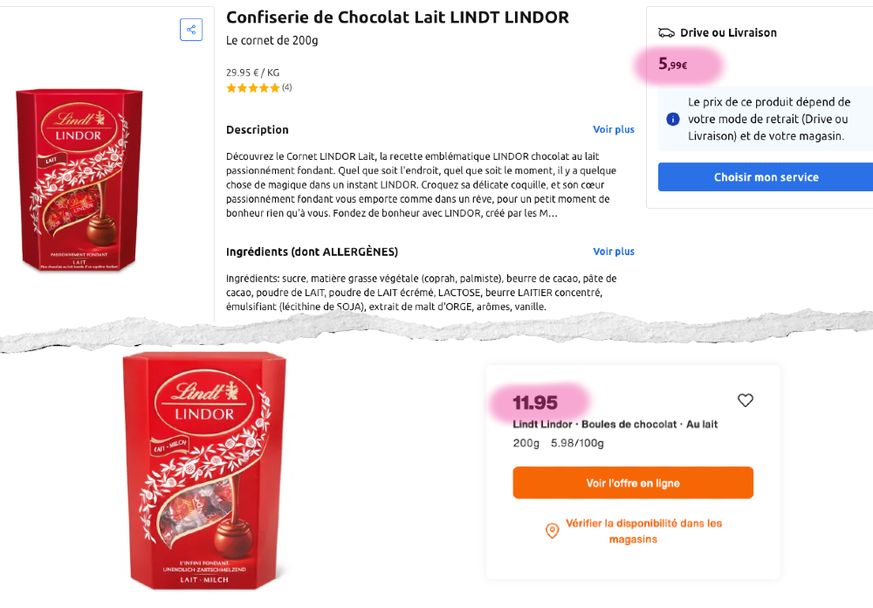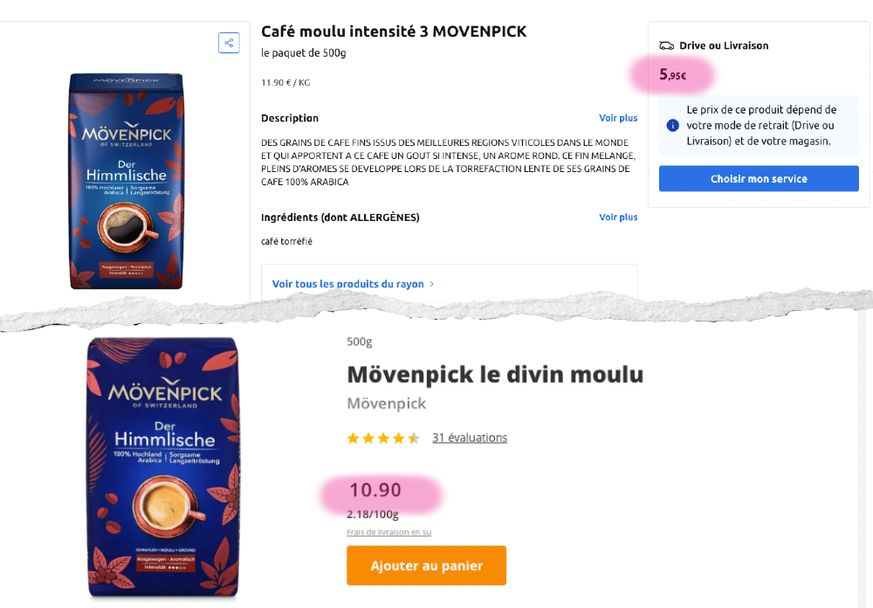
Ricola, Lindt, ON and others are sold cheaper in FranceImage: watson
Certain well -known products of the Helvetians, such as Lindor balls, the Mövenpick coffee or Ricola candies, cost less in neighboring countries than in Switzerland. While brands defend themselves, the French -speaking consumers’ federation denounces the margins of retailers.
14.04.2025, 07:3514.04.2025, 07:35

Follow me
This case had made a lot of talk. Last year, the Daily Anzeiger discovered that the shoes of the Swiss brand were sold up to 55% cheaper abroad than in Switzerland. Just browse your online store to realize it. The Cloud 6 model for men, for example, costs 190 francs in Switzerland, while in the United Kingdom, France or the United States, customers must only pay the equivalent of 153, 150 and 129 francs, respectively.
A situation which can question, in particular on the part of a mark represented by Roger Federer and which likes to highlight his suissitude. A small tour on the other side of the border shows that this is not an isolated example. Other iconic Swiss products, much more daily use, are also sold cheaper abroad.
This is the case for Lindor balls. The 200 -gram cornet costs 11.95 at Coop and Migros, but only 5.99 euros at Carrefour, or 5.60 francs – it’s less than half. Villars chocolate is also cheaper in France: the same tablet of 100 grams returns 2.46 euros (2.30 francs) at Auchan, against 4.60 francs at Coop. Again, the difference amounts to 50%.

Lindor balls, sold 11.95 francs at Migros, cost half at Carrefour, in France.Image: watson
Same scenario for Mövenpick’s “Divine Moulu” coffee, the price of which decreases almost half once crossing the border – the 500 gram package costs 10.90 at Coop and the equivalent of 5.60 francs at Carrefour. Let us also quote the Kambly Butterfly cookies, the cost of which goes from 2.38 euros (2.25 francs) at Auchan at 4.4 francs at the Coop. Or the Ricola candies with herbs, sold 3.49 euros (3.30 francs) at Bennet, Italy, and 4.20 francs in the stores of the Orange giant.
Note that all these products are made in Switzerland, at least those sold in our country, and that they willingly display the Swiss flag or the “Swiss” mention on their packages.
Manufacturers react
The brands that responded to our requests highlight several arguments. A spokesperson from Lindt & Sprüngli indicates that prices must be set taking into account the requirements of the local commercial environment. The situation in Switzerland and France would therefore not be comparable. She develops:
“Switzerland presents cost structures different from those of the countries of the euro zone, for example with regard to salary and logistical costs or marketing and promotion costs, which are relevant for the fixing of prices both on the manufacturer’s and on the side of trade.”
A spokesperson from Lindt & Sprüngli
The diversity of Swiss and French markets is also mentioned in Mövenpick’s response. The brand stresses that “pricing is the exclusive responsibility of dismissed partners, as well as retail”. “In France as in Switzerland, pricing is left to the discretion of retailers,” abounds the spokesperson for Lindt & Sprüngli.

The difference in the price of the Mövenpick coffee between France and Switzerland.Image: watson
Villars, which wishes to specify that all its products are manufactured in Friborg, also indicates that the fixing of selling prices to consumers is under the responsibility of the brands. “We do not have the opportunity to act on their promotional policy,” said.
Mövenpick finally adds that the comparison relates to two different currencies, the franc and the euro, whose exchange rates are “likely to fluctuate”.
“Maximization of profits”
These explanations leave the French -speaking Federation of Consumers (FRC) skeptical. “The argument of salaries raised in Switzerland as a main justification does not hold”, sweeps Jean Busché, economics & NICT manager with the FRC.
“In reality, when the products are imported, costs related to local wages have no significant effect on prices”
Jean Busché, FRC
The manager quotes research mandated by the retail lobby and confirmed by Mr. Prix and the Confederation, according to which the unit cost of labor in Switzerland is even slightly lower compared to neighboring countries. “As for local products, wages only represent an average of 11% of the price differential observed, according to a SECO study in 2003,” he adds.
For Jean Busché, the explanation is located elsewhere: brands and distributors would use the high purchasing power of Swiss consumers to increase their margins. He sums up:
“It is not simply a logical adaptation to local costs, but a profits maximization strategy to the detriment of Swiss consumers”
Jean Busché, FRC
“This situation reveals that the high prices charged in Switzerland are largely due to excessive margins made on several levels of the commercial chain, in particular by distributors,” he continues.
Jean Busché denounces in particular major brands like Migros and Coop, which he accuses of making margins “significantly exceeding reasonable levels”, as demonstrated by several FRC surveys. “This reflects a structural problem linked to an effective lack of competition and a price opacity, in others in the agrifood sector,” he notes. And conclude:
“Thus, consumers are victims of a system that forces them to support abusive margins without real benefit in return”
Jean Busché, FRC












